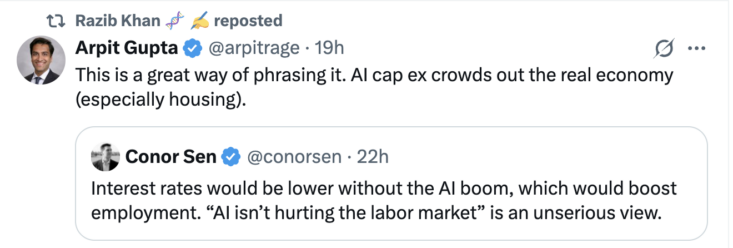These tweets caught my eye:
I suspect that it would be possible to create some sort of argument that the AI boom is hurting the job market, but at the risk of being unserious I don’t find this one to be particularly persuasive. Suppose I made the following argument:
Interest rates would be lower if we went into recession, which would help employment. “Economic booms don’t hurt the job market” is an unserious view.
Long time readers have probably guessed that I’d view this hypothetical claim as an example of the fallacy of “reasoning from a price change.”
In some respects, it is surprising that the labor market is so strong. We had a period of high inflation during 2021-23, and unemployment often rises sharply when the Fed uses a restrictive monetary policy to bring inflation back down. Why has unemployment merely edged up from 3.4% to 4.2%? I’m not certain, but perhaps because the disinflation policy was gradual, and even today inflation remains above the Fed’s 2% target. Nonetheless, if the labor market is currently a bit subpar, it is probably due to the lingering effects of the Fed’s anti-inflation policy, not the AI boom.
I certainly agree with claims that unemployment might rise if the Fed pushed interest rates above their natural rate. But an AI boom tends to raise the natural rate of interest. Other things equal (including the Fed’s target interest rate), a higher natural rate of interest is actually expansionary—likely to lead to faster NGDP growth. Of course other factors such as the lower rate of immigration tend to reduce the natural rate of interest, so I’m agnostic on the question of whether monetary policy is currently too tight. (As an aside, TIPS markets are currently pricing in about 2.5% inflation over the next 5 years, which doesn’t suggest that money is particularly tight.)
Perhaps there’s an argument that AI spending crowds out more labor intensive industries, although in principle the Fed should offset that effect. Of course monetary policy is not perfect, but the internet boom of 1999-2000 doesn’t seem to have hurt the labor market. In 2000, unemployment fell to the lowest level since the 1960s. We eventually did have a mild recession, after the Fed engineered much slower NGDP growth in 2001.
The post A Serious Look at Interest Rates appeared first on Econlib.
Click this link for the original source of this article.
Author: Scott Sumner
This content is courtesy of, and owned and copyrighted by, https://www.econlib.org and its author. This content is made available by use of the public RSS feed offered by the host site and is used for educational purposes only. If you are the author or represent the host site and would like this content removed now and in the future, please contact USSANews.com using the email address in the Contact page found in the website menu.








